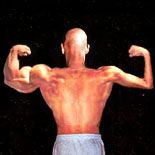The universe doesn’t care. All of the thoughts we have on cunning or iPods or dirt are so much electrical discharge, no more consequential than static. Humans are incidental material, and their self-awareness is a byproduct of their particular material configuration. If you view Earth on the infrared scale then it looks just a little brighter than Mars. The difference negligible. When you zoom out, any individuality loses meaning and all we see is the collective crust of biomass, like frost on a window pane.
On the other hand, life and frost are similar in that they’re both manifestations of order in chaos. Life seems significant to us because of this, and because patterns provide the basis of one of our primary survival senses. We are pattern-seekers. Life defines itself from inert matter in that it seeks to preserve itself at any cost, while natural order seeks to preserve or encourage a sustainable mechanism. Raw ecological sustainability is most often a factor of this inertia, and choice is usually not a factor in the matter. Humanity, however, is guided by factors beyond mere survival.
We contemplate resource allocation, accumulation, and control. We hoard and obsess and create things that satisfy esoteric desires that lie beyond basic survival needs. We contemplate our own thoughts, and intangibles, and abstractions. Tradition, fashion, ritual, habit, preference all seem geared to cope with (or to manage) the fact that there can be no absolute if the universe as we know it is without perceivable end. But what truly defines us? Is it curiosity? Or sentience? Play? Creativity?
Curiosity – Inert objects do no possess this quality as far as we can tell, but its value seems an integral part of who we are. As we seek to isolate that which defines us we focus on these things. Why do we exist? Do we deserve to exist? Is there a single answer? I don’t think there are absolute answers to those questions, because those aren’t the real questions at all. Those questions form as a byproduct of sentience.
Sentience – The real question will always be: How is it that I am able to question? I think the troubling realization of awareness is behind our collective desire to abstract our reality. Our choice is limited, and is significant not because it exists, but because we are aware that it exists. A lion may choose which gazelle to pounce upon based on whatever factor, but it will not contemplate the choice later. We contemplate our place within a continuum.
Play – It’s worth noting because play is not universal. Does the wind play? Do amoebae play? Do plants practice a slow play that we can’t comprehend? Are they having fun? Do they possess a sense of humor or creativity? Where does play come from? Much of it seems to be about practice: basic survival mechanisms manifesting without the consequences of survival. Play can be about domination (wrestling) and sex (dancing) and food (bonbons) and communication (music). I think these things suggest that play is a primal source of advantage.
Creativity – This seems more an augmentation of intelligence. It means that we may realize that there are manifold, non-linear ways to realize a desired goal. Creativity, its expression and the observation of it, gives us pleasure. It rewards us, which means that it is of some benefit. Why? Simply because the meta goal that drives cleverness and cunning is innovation. Innovation is advantageous, but not always linear.
But those things are only the start. A clearer answer emerges as we examine these factors:
Choice – Of the things above, what we honor – what we choose – is guided not only by our individual perception, which is a factor of our material configuration, but by factors beyond the immediate.
Significance – It implies qualification. Love and beauty and conscience and meaning feel significant to us because they are advantageous to our preservation. Doubt and fear and waste and guilt and pain, insofar as they represent some measure of immediate disadvantage, are troubling, but are no less the byproducts of an overall successful mechanism.
At its root, choice involves using certain criteria to arrive at a decision when presented with multiple options. But can it not be more than that? Creativity, intelligence, and an awareness of significance – of persistence within a continuum – provide a choice that lions cannot conceive. To a lion the decision to go for the smallest, closest, or meatiest gazelle depends on a given set of circumstances. But we can arrive at a choice born of something more than circumstance: intuition, projection, sacrifice, or curiosity.
What if we go after the fastest gazelle, with the realization that our chances of catching it are slim, just to see how fast it is? We might learn something from that that will add to the overall body of our knowledge, which will provide advantage in the future. What if we were to go after the second closest gazelle because our friend isn’t as fast as we are, and we are willing to act in a way that we both may eat? Is that sacrifice? What if we intimidate the gazelles until they become mentally weary, and then pick off ten of them at a time? Perhaps it’s not ecologically sustainable, but we are no longer acting as part of the ecology alone when behavior transcends mere survival.
Our unique advantage is that we’re able to perceive a greater whole than ourselves, and have the capacity to understand that an immediate loss might somehow preserve or benefit this greater whole. The conscious notion of this possibility in combination with creativity might lead us to ways that we might provide others without detriment to ourselves.
But why? If this whole thing is an accident, and there’s no goal, no absolute right, nor wrong, why bother? Maybe for the fun of it? Or maybe because doing good feels good because it’s most efficient. I don’t know. How can we be fulfilled while avoiding pain? Can we give more than we take? Can we help more than hurt?
Having said that, I’ve just swatted a gnat.
 The usher is using a small flashlight to show people where their seats are. The way he wields it it’s not even a tool, but rather an extension of himself. He has one normal hand, and one lightbulb hand that exists to show people where to sit. In fact when someone approaches him to ask about something not related to sitting, “Pardon me, where are the restrooms?” he uses his lightbulb hand to point up the aisle, and then to the right. That’s not the use his lightbulb hand was intended for, but already he’s adapted. If he had an itch I’m sure he would scratch it using the warm red glow of his lightbulb hand. Later that night he finds himself frustrated as he tries to feed himself with it. Foiled by the lack of articulation in their lightbulb hands, his species will eventually die out, their bulbs fading, eventually, to permanent darkness.
The usher is using a small flashlight to show people where their seats are. The way he wields it it’s not even a tool, but rather an extension of himself. He has one normal hand, and one lightbulb hand that exists to show people where to sit. In fact when someone approaches him to ask about something not related to sitting, “Pardon me, where are the restrooms?” he uses his lightbulb hand to point up the aisle, and then to the right. That’s not the use his lightbulb hand was intended for, but already he’s adapted. If he had an itch I’m sure he would scratch it using the warm red glow of his lightbulb hand. Later that night he finds himself frustrated as he tries to feed himself with it. Foiled by the lack of articulation in their lightbulb hands, his species will eventually die out, their bulbs fading, eventually, to permanent darkness. My iPod’s wee foam earbuds don’t fit perfectly: the left bud is snug, but the right is a touch too tight. And this isn’t because the appliance is imperfect. My earphones are symmetrical, but I am not. I remember a time when this realization would have been cause for profound concern, because symmetry was just about all I had to rely on when I was a child–it seemed dependable as few things were. But time has given me an appreciation for the misaligned, the uneven, the drifted.
My iPod’s wee foam earbuds don’t fit perfectly: the left bud is snug, but the right is a touch too tight. And this isn’t because the appliance is imperfect. My earphones are symmetrical, but I am not. I remember a time when this realization would have been cause for profound concern, because symmetry was just about all I had to rely on when I was a child–it seemed dependable as few things were. But time has given me an appreciation for the misaligned, the uneven, the drifted.